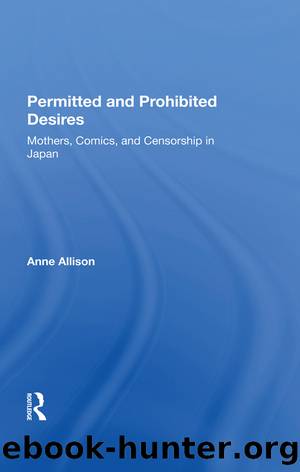Permitted and Prohibited Desires: Mothers, Comics, and Censorship in Japan by Anne Allison

Author:Anne Allison [Allison, Anne]
Language: eng
Format: epub
Tags: Ethnic Studies, Censorship, American, Asian American Studies, Social Science, Political Science, World, Asian, Regional Studies
ISBN: 9781000315707
Google: AK6bDwAAQBAJ
Amazon: B07SR61FC7
Goodreads: 49480221
Publisher: Routledge
Published: 2019-06-04T00:00:00+00:00
KyÅiku Mama: The Everyday Instiller of Everyday Education
In this chapter my aim is to examine the relationship between two institutions, school and motherhood, in terms of how this intersection is shaped by school ideology and practices and how it is experienced by women who are mothers. Broadly I am interested in the KyÅiku mama, a mother so committed to furthering the education of her child that she does everything from sharpening pencils, making midnight oya shoku (snacks), and pouring tea for a studying child to consulting with teachers; investigating the range of schools, tutors, and juku (cram schools) available; and boning up on subjects where her child is deficient. Literally KyÅiku mama means âeducation motherâ and is a term both of respect and reprobation: respect for those mothers who are successful in seeing children through the competitions of the Japanese school system and reprobation for the pressure they consequently must exert on children whose days, nights, and energies are consumed by study. Mamagon, or âmother dragon,â is a term referring to the condemned aspect of the KyÅiku mama syndrome.
Here my focus is not on the entirety of the KyÅiku mama phenomenon, one that has arisen in the post-World War II environment of economic rebuilding, national mobilization of the school system, smaller families, and long commutes to workplaces, all of which have encouraged close mother-child relations in which women often single-handedly supervise the education of their children in the absence of fathers and husbands. My aim is to look at one phase of the KyÅiku mama life cycleâa motherâs role when her child enters nursery school. I will investigate this role in terms of the relationships between school and mothers that produce the behaviors involved in âeducation motherhood.â Specifically, I will pursue two questions: (1) How does the school manage, shape, and monitor a womanâs behavior in her role as mother? (2) How do women experience the expectations placed on them by the school system and the educational demands generally of Japanâs supercompetitive, schooled society?
I have chosen the nursery school as the site for these investigations despite the arguments made by such scholars of Japanese education as Lois Peak. She has minimized the importane? of the motherâs role in the socialization of children to school because âJapanese believe that the home and the school are so dissimilar that it is difficult for the family to teach the behavior the child will need in the classroomâ (1991:6).
In Peakâs view, the school provides the atmosphere for shÅ«dan seikatsuâgroup lifeâthe key structure to such institutions as the Japanese workplace and one that could never be replicated at home. In fact, the childrenâs position as center in a family and the willingness of mothers to indulge them in a relation of spoiled dependent (this behavior of acting spoiled is called amae in Japanese) is inimical to the behavior expected of students. Therefore, according to Peak, home and specifically the child-mother relationship not only are not consistent with the interpersonal dynamics of school but must be actively transcended and displaced in the school environment.
Download
This site does not store any files on its server. We only index and link to content provided by other sites. Please contact the content providers to delete copyright contents if any and email us, we'll remove relevant links or contents immediately.
Rewire Your Anxious Brain by Catherine M. Pittman(18643)
Talking to Strangers by Malcolm Gladwell(13349)
The Art of Thinking Clearly by Rolf Dobelli(10455)
Mindhunter: Inside the FBI's Elite Serial Crime Unit by John E. Douglas & Mark Olshaker(9324)
Becoming Supernatural by Dr. Joe Dispenza(8201)
Change Your Questions, Change Your Life by Marilee Adams(7760)
Nudge - Improving Decisions about Health, Wealth, and Happiness by Thaler Sunstein(7693)
The Road Less Traveled by M. Scott Peck(7594)
The Lost Art of Listening by Michael P. Nichols(7494)
Mastermind: How to Think Like Sherlock Holmes by Maria Konnikova(7323)
Enlightenment Now: The Case for Reason, Science, Humanism, and Progress by Steven Pinker(7306)
Win Bigly by Scott Adams(7184)
The Way of Zen by Alan W. Watts(6601)
Daring Greatly by Brene Brown(6504)
Big Magic: Creative Living Beyond Fear by Elizabeth Gilbert(5756)
Grit by Angela Duckworth(5604)
Ego Is the Enemy by Ryan Holiday(5414)
Men In Love by Nancy Friday(5234)
The Laws of Human Nature by Robert Greene(5173)
